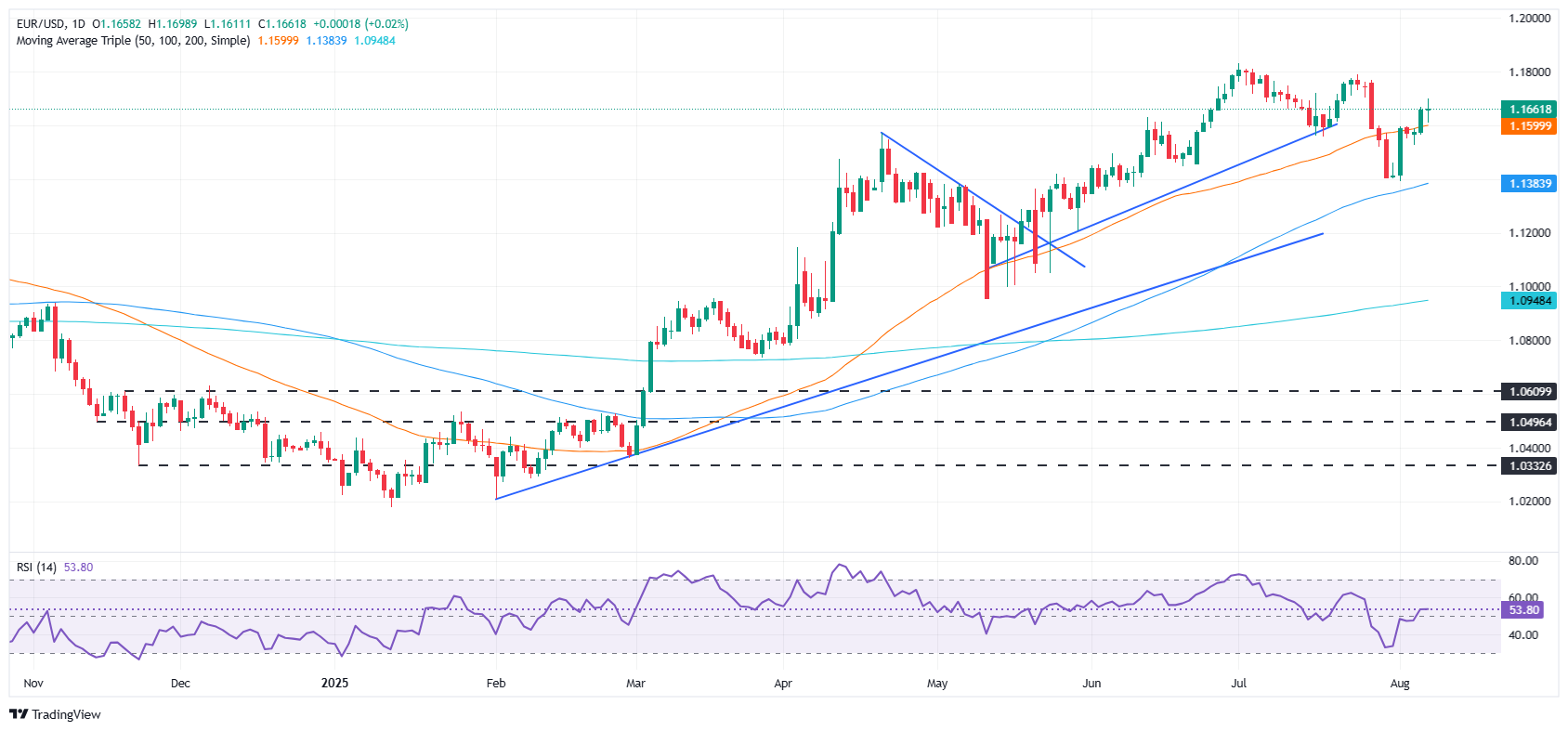Created
: 2025.08.08














![]() 2025.08.08 06:53
2025.08.08 06:53
The EUR/USD turned flat late on Thursday, spurred by rumors that the White House is considering Federal Reserve Governor Christopher Waller as the top candidate to be the next Fed Chair, succeeding Jerome Powell. Economic data in the US has been ignored by investors, who are digesting Trump's choice to replace Kugler with Dr. Stephen Miran for a period that would end in January 2026. The pair trades at 1.1661.
Bloomberg revealed that "Trump advisers are impressed with Waller's willingness to move on policy based on forecasting, rather than current data, and his deep knowledge of the Fed system as a whole," in a news article called "Waller Emerges as Favorite for Fed Chair Among Trump Team."
Waller, who was one of the dissenters at last week's Federal Open Market Committee (FOMC) meeting, leaned dovish and commented that the labor market was beginning to show signs of cracking. He was vindicated by the dismal revision for May and June employment reports and further confirmed by today's data.
The EUR/USD dipped on the news as the Greenback strengthened somewhat, capping the pair's advance toward 1.1700.
On the economic data front, the number of Americans who signed up to get unemployment benefits exceeded forecasts last week. Alongside this, Continuing Claims, which are recurring applications for jobless claims, surged to their highest level since November 2021, the Department of Labor announced.
Across the pond, German Industrial Production (IP) fell over the last three months, by -1.6% in April, -0.1% in May, and -1.9% in June. IP fell to its lowest level since April 2010, excluding the COVID-19 dip in March 2020.
Traders' eyes turn to Federal Reserve officials' speeches, with participants eyeing cues about the Fed's next move. On the data front, the University of Michigan Consumer Sentiment for August will be unveiled, along with inflation expectations.
The EUR/USD advance stalled below 1.1700 after buyers cleared the 20-day Simple Moving Average (SMA) at 1.1624. Momentum is also flashing signs of consolidation as depicted by the Relative Strength Index (RSI). The RSI is still bullish, but directionless.
Therefore, if EUR/USD resumes upwards, it needs to breach 1.1700. Once done, this clears the path toward 1.1800 ahead of testing the yearly high of 1.1829. Conversely, if the pair dives below the 20-day SMA, look for a test of the 50-day SMA at 1.1605 ahead of 1.1600. If broken, the next support would be the 1.1500 mark.

The Euro is the currency for the 19 European Union countries that belong to the Eurozone. It is the second most heavily traded currency in the world behind the US Dollar. In 2022, it accounted for 31% of all foreign exchange transactions, with an average daily turnover of over $2.2 trillion a day. EUR/USD is the most heavily traded currency pair in the world, accounting for an estimated 30% off all transactions, followed by EUR/JPY (4%), EUR/GBP (3%) and EUR/AUD (2%).
The European Central Bank (ECB) in Frankfurt, Germany, is the reserve bank for the Eurozone. The ECB sets interest rates and manages monetary policy. The ECB's primary mandate is to maintain price stability, which means either controlling inflation or stimulating growth. Its primary tool is the raising or lowering of interest rates. Relatively high interest rates - or the expectation of higher rates - will usually benefit the Euro and vice versa. The ECB Governing Council makes monetary policy decisions at meetings held eight times a year. Decisions are made by heads of the Eurozone national banks and six permanent members, including the President of the ECB, Christine Lagarde.
Eurozone inflation data, measured by the Harmonized Index of Consumer Prices (HICP), is an important econometric for the Euro. If inflation rises more than expected, especially if above the ECB's 2% target, it obliges the ECB to raise interest rates to bring it back under control. Relatively high interest rates compared to its counterparts will usually benefit the Euro, as it makes the region more attractive as a place for global investors to park their money.
Data releases gauge the health of the economy and can impact on the Euro. Indicators such as GDP, Manufacturing and Services PMIs, employment, and consumer sentiment surveys can all influence the direction of the single currency. A strong economy is good for the Euro. Not only does it attract more foreign investment but it may encourage the ECB to put up interest rates, which will directly strengthen the Euro. Otherwise, if economic data is weak, the Euro is likely to fall. Economic data for the four largest economies in the euro area (Germany, France, Italy and Spain) are especially significant, as they account for 75% of the Eurozone's economy.
Another significant data release for the Euro is the Trade Balance. This indicator measures the difference between what a country earns from its exports and what it spends on imports over a given period. If a country produces highly sought after exports then its currency will gain in value purely from the extra demand created from foreign buyers seeking to purchase these goods. Therefore, a positive net Trade Balance strengthens a currency and vice versa for a negative balance.
![]()
Created
: 2025.08.08
![]()
Last updated
: 2025.08.08

FXStreet is a forex information website, delivering market analysis and news articles 24/7.
It features a number of articles contributed by well-known analysts, in addition to the ones by its editorial team.
Founded in 2000 by Francesc Riverola, a Spanish economist, it has grown to become a world-renowned information website.
We hope you find this article useful. Any comments or suggestions will be greatly appreciated.
We are also looking for writers with extensive experience in forex and crypto to join us.
please contact us at [email protected].
Disclaimer:
All information and content provided on this website is provided for informational purposes only and is not intended to solicit any investment. Although all efforts are made in order to ensure that the information is correct, no guarantee is provided for the accuracy of any content on this website. Any decision made shall be the responsibility of the investor and Myforex does not take any responsibility whatsoever regarding the use of any information provided herein.
The content provided on this website belongs to Myforex and, where stated, the relevant licensors. All rights are reserved by Myforex and the relevant licensors, and no content of this website, whether in full or in part, shall be copied or displayed elsewhere without the explicit written permission of the relevant copyright holder. If you wish to use any part of the content provided on this website, please ensure that you contact Myforex.
Myforex uses cookies to improve the convenience and functionality of this website. This website may include cookies not only by us but also by third parties (advertisers, log analysts, etc.) for the purpose of tracking the activities of users. Cookie policy